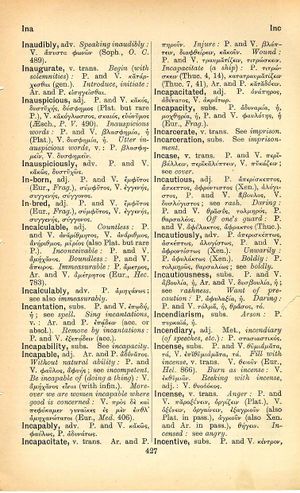incense: Difference between revisions
From LSJ
Γράμματα μαθεῖν δεῖ καὶ μαθόντα νοῦν ἔχειν → Prudentia opus est, ubi didiceris litteras → Das Lesen lerne, Schreiben, und dann aufgepasst
(CSV4) |
(6_8) |
||
| Line 8: | Line 8: | ||
<b class="b2">Anger</b>: P. and V. παροξύνειν, ὀργίζειν (Plat.), V. ὀξύνειν, ὀργαίνειν, ἐξαγριοῦν (also Plat. in pass.), ἀγριοῦν (also Xen. and Ar. in pass.), θήγειν. | <b class="b2">Anger</b>: P. and V. παροξύνειν, ὀργίζειν (Plat.), V. ὀξύνειν, ὀργαίνειν, ἐξαγριοῦν (also Plat. in pass.), ἀγριοῦν (also Xen. and Ar. in pass.), θήγειν. | ||
<b class="b2">Incensed</b>: see [[angry]]. | <b class="b2">Incensed</b>: see [[angry]]. | ||
}} | |||
{{Lewis | |||
|lshtext=<b>incensē</b>: false [[read]]. in Gell. 10, 3, 13, [[instead]] of [[impense]]; v. [[impendo]]. | |||
}} | }} | ||
Revision as of 08:33, 13 August 2017
English > Greek (Woodhouse)
subs.
P. and V. θυμιάματα, τά, V. ἐπιθυμιάματα, τά. Fill with incense, v. trans. V. θειοῦν (Eur., Hel. 866). Burn as incense: V. ἐκθυμιᾶν. Reeking with incense, adj.: V. θυοδόκος. v. trans. Anger: P. and V. παροξύνειν, ὀργίζειν (Plat.), V. ὀξύνειν, ὀργαίνειν, ἐξαγριοῦν (also Plat. in pass.), ἀγριοῦν (also Xen. and Ar. in pass.), θήγειν. Incensed: see angry.
Latin > English (Lewis & Short)
incensē: false read. in Gell. 10, 3, 13, instead of impense; v. impendo.

